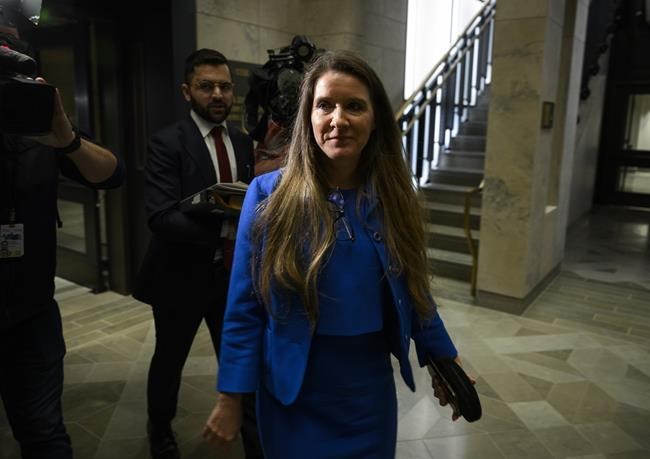OTTAWA — Directors from past Liberal and Conservative campaigns told a House of Commons committee Tuesday that concerns raised by national security officials would not necessarily be reason enough for them to drop a candidate from their rosters.
They testified Tuesday at a meeting of the procedure and House affairs committee, which is probing the issue of foreign interference in Canadian affairs.
Pressure on Prime Minister Justin Trudeau and his government has steadily ramped up amid a string of media reports that alleged, citing anonymous sources, that Beijing tried to influence the outcome of the past two federal elections.
One such report, published by Global News, alleged that Toronto MP Han Dong benefited from Chinese foreign interference in his successful bid to become the Liberal candidate for his riding in 2019. The report is cited in a lawsuit he has launched against the company, which stands by its reporting.
Jeremy Broadhurst, who serves as a senior adviser to Trudeau and managed the Liberal party's 2019 campaign, poured cold water Tuesday on the allegation reported by Global that national security officials had warned Trudeau about Dong and recommended that he be dropped as a candidate.
Broadhurst said that based on his experience working in government and with those in security, they would have "never" made such a recommendation.
"It's not the role of intelligence to dictate to parties about how they conduct their affairs," he said. "The determinations of candidates are the bailiwick of parties."
The committee heard about how the realities of partisan politics collide with intelligence sharing multiple times Tuesday, as two campaign directors for the Conservative Party of Canada testified about receiving vague information — if any at all — from a task force of security officials and federal public servants set up to monitor interference attempts in the past two federal votes.
Fred DeLorey, who ran the Tories' 2021 campaign, said "it felt like a one-way street" when it came to working with the group.
He said that while the party heard "the odd rumbling" during the race that something was amiss, concerns about foreign interference attempts grew louder once the results came in and the party saw surprising losses in Greater Toronto Area and Metro Vancouver ridings that have large Chinese-Canadian communities.
DeLorey said a memo prepared for him after the election raised concerns that individuals were spreading false information about the party and its candidates online and in ads that targeted the Chinese-Canadian community. The memo said the messaging appeared to favour the Liberals in some cases.
He said the party's representatives in the task force told him that after they brought forward the information, officials noted "there were legislative gaps and there was nothing that could be done."
DeLorey told MPs that former party leader Erin O'Toole estimated as many as nine ridings had been targeted. But he said that losing those seats to the Liberals would not have changed the outcome of the election.
Even so, DeLorey said lawmakers should usher in changes to ensure that security officials better understand how party politics work.
"This is an expert profession," he said. "Until you're in it, you don't know what it looks like."
Hamish Marshall, who ran the 2019 campaign for the Tories, said he received only "vague" and "high level" information from the officials tasked with monitoring inference attempts during that vote. It was the first time such a process even existed.
He recommended that officials tasked with this job the next time around get used to working with partisans earlier than election time.
On the issue of whether political parties should drop candidates based on information from national security officials, Marshall said it is important to understand that parties are "loathe" to ditch people who are registered to run under their banners and selected by their memberships.
Reflecting on the reporting about Dong, Marshall said: "I've often thought, 'What would I have done in that situation if CSIS had come to us?''"
He said removing a candidate would require "very specific" and "tangible" allegations.
"The information that we would have to be presented with in order to take action on it … would have to be very, very detailed."
Azam Ishmael, the national director of the Liberal Party of Canada who oversaw its 2021 campaign, told MPs that if it received information about a candidate through a security briefing, party officials would face restrictions on whom they could give it to, for security reasons.
"We probably would not be at liberty to discuss it with a candidate or their campaign team, because they wouldn't have the proper clearance," he said.
"We could only discuss it with the people who had the appropriate clearance."
Broadhurst added that political parties are not law enforcement agencies.
"There's a moment where you have to say, 'It is not appropriate for us to start investigating a crime,' for example," said Broadhurst, adding that the prime minister or party leader would be informed if there was evidence of wrongdoing.
"If we were the ones discovering this information, we would obviously be handing that over to authorities immediately."
Asked earlier about results the Tories allege could have been affected by Beijing's meddling, Ishmael suggested those voting shifts were the result of the Conservative party's stance on gun-control, which erupted as an issue during the campaign.
The committee also recently heard from Trudeau's longtime chief of staff, Katie Telford, who repeatedly told MPs that national security provisions prevented her from divulging details about briefings on interference.
Trudeau has tasked former governor general David Johnston with investigating allegations of foreign interference.
Johnston is expected to come back by late May with a recommendation on whether or not a full public inquiry into the issue is necessary. His final recommendations are due at the end of October.
This report by The Canadian Press was first published April 25, 2023.
Stephanie Taylor, The Canadian Press




